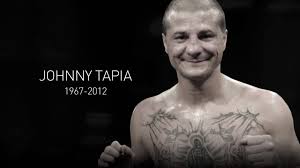Johnny Tapia: Champion and Tragedy Rolled Into One
 By “Big” Bill Bradshaw
By “Big” Bill Bradshaw
Boxing is a tough sport filled by tough people who have lived tough lives. Of course there are exceptions, Wladimir Klitschko has a PhD, but even Dr Steelhammer had to endure the tragedy of his father’s cancer diagnosis following his involvement in the post Chernobyl clean up operation in 1986. If tough days and tragedy are cornerstones of the fight game, none came more prepared for the ring than ‘Mi Vida Loca’ Johnny Tapia. He was born on February 13th 1967 in Albuquerque, New Mexico and trauma followed him the rest of his days. He learned early that his father had been murdered before his birth so he faced a childhood being raised by his mother, Virginia, his grandfather and extended family.
When he was 8 years old, his mother was kidnapped, raped, beaten, stabbed 26 times with a scissors and a screwdriver and hanged. The young Johnny was woken by her screams and witnessed Virginia chained to the back of a pick up truck as it drove away. She was found later by a roadside and police believed she had crawled 100 yards to where she might be seen. She was rushed to hospital but passed away from her injuries four days after the attack. He would later say that, when he took up boxing, he saw every opponent as his mother’s killer.
Within a year of his mother’s death, Tapia’s uncles had him fighting older kids for money and, he recounted, if he lost he was beaten. Nevertheless an outstanding amateur career would follow culminating in a Golden Gloves light Flyweight title in 1983 and the Flyweight title two years later. He turned to the paid ranks in 1988 and won eight bouts that year. In 1989 he notched up another seven wins and repeated that in 1990. Life had finally picked up for Tapia and his name was buzzing around the industry. Magazine covers carried his picture and promoters were eyeing big paydays. But news soon broke that Johnny had tested positive for cocaine. The results were confirmed and Tapia was hit with a three and a half year suspension.
He returned to the ring on March 27th 1994 with a knockout win against Jaime Olvera in Tulsa, Oklahoma and racked up another four wins before defeating Henry Martinez seven months later to lift the WBO Super Flyweight title. Tapia went on to establish an incredible unbeaten record before becoming a two division world champion when lifted the WBA Bantamweight title from Nana Konadu on December 5th 1998. With a record of 48 – 0, the future looked bright and mega bout was set up against highly ranked contender Paulie Ayala. Two weeks before the bout, Tapia received a phonecall in his training camp. A police officer told him that, after 16 years, his mother’s murder had finally been solved and that her killer had stumbled drunkenly onto a street in 1983 and had been hit by more than one car. Tapia went into meltdown. Although the Ayala bout went ahead, Johnny suffered his first defeat in Ring Magazine’s ‘Fight of the Year’ and some weeks later he attempted suicide by overdose and was hospitalized. It was not the first time he had danced with death and it wouldn’t be the last.
Following a period of reflection, Tapia said that, although the news of his mother’s killer was devastating to him, he would take the closure as a blessing and devote his career to her. He was quickly back in business with a world title win over Jorge Julio for the WBO Bantamweight title in 2000 but following a highly controversial, failed attempt to unify the belts against his old nemesis Paulie Ayala, Tapia decided to move to featherweight. He won the IBF Featherweight title against the super tough Manuel Medina in 2002 but lost by unanimous decision to Marco Antonio Barrera in a unification bout.
Over the following years, Tapia would retire and comeback many times but his battle with drug addiction would dominate his life in the most shocking way. Following one of his comeback bouts, Johnny was found unconscious on the floor of his hotel room on March 12th 2007. He was rushed to hospital where it was found that he had overdosed on cocaine. The following day, his brother in law and his nephew were killed in a car accident while travelling to visit Tapia. “It’s my fault” he would later say “I killed them both”. A further comeback attempt the following year was stalled due to contractual issues and Johnny was arrested in 2009 for a violation of parole on drugs offences. Tapia fought twice in 2010 but his life would be completely upended when the father he had always believed deceased was, in fact, released from a Federal Penitentiary and DNA results confirmed paternity. He fought and won his last bout in 2011. He retired with a record of 59 (30KO’s) – 5 with 2 draws. He had attempted suicide many times and had been declared clinically dead five times following drug overdoses.
Tapia was always a flamboyant individual and, of his many tattoos, the words ‘Mi Vida Loca’ (My Crazy Life) across his stomach probably summed him up best. His wife Teresa once said ‘I don’t know how the story is going to end. I’d love to think that, in 30 years, we’d be old together and surrounded by family. But when I ask Johnny how he sees himself in the future, he say’s he’s not even sure if he’ll wake up tomorrow”. On May 27th 2012, Johnny Tapia was found dead in his Albuquerque home. He was 45 years old and he died of a heart attack. He is survived by his wife and their three children. A great career and a tragic life was finally over.


